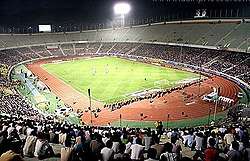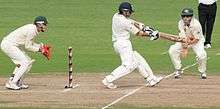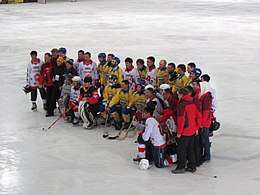Sports in Asia
Association football (also known as Soccer) is the most popular sport in almost all Asian countries. Cricket is the second most popular sport in Asia.[1] Other popular sports in Asia include baseball, basketball, badminton and table tennis among others. Top sporting nations in Asia include China, Taiwan, Japan, India, South Korea and Philippines.
.jpg)
Association football

The Asian Football Confederation was founded in 1954. They organize several tournaments for national teams, most notably the AFC Asian Cup since 1956 and AFC Women's Asian Cup since 1975, as well as qualifying tournaments for the FIFA World Cup, FIFA Women's World Cup and the Summer Olympics. The AFC Champions League is Asia's premier tournament for clubs, first held in 1967.
The AFC members are split into five regional federations: West, Central, South, East and South East. These federations organize regional football championships.
The most successful Asian countries in international men's competitions have been Japan and South Korea in East, and Iran and Saudi Arabia in the West. In women's football, East Asian have been dominant, especially Japan, China and North Korea. Asia has been more successful in women's football than in men's football in the continent.
The 2002 FIFA World Cup was hosted jointly by Japan and South Korea. It was the first edition not held in Europe or the Americas. The 2017 FIFA U-17 World Cup was hosted by India. The 2022 FIFA World Cup is scheduled to take place in Qatar, but it was announced that it could be cancelled for bribery during the bidding process.
The People's Republic of China hosted the first edition of the FIFA Women's World Cup in 1991, as well as the 2007 edition.
Bandy
Bandy is a growing sport in Asia. While traditional in some former Soviet republics, especially Kazakhstan (bandy is the only team sport in which Kazakhstan has captured World Championship medals), it is more or less new in some other ones. President Tsakhiagiin Elbegdorj invited the Mongolian national team after its bronze medal in Division B of the 2017 World Championship.[2] Japan also reached the semi-final. Consequently, Mongolia beat them in the bronze match. China started to compete in the World Championship in 2015 and the women's national team in 2016. Both Division B of the men's tournament 2018 and 2018 Women's World Championship (in which Japan plan to debut) will be played in China, which will be the first time either tournament is held in a totally Asian country (the area north and west of the Ural River is located in Europe, thus Kazakhstan, where the 2012 World Championship was held, is a transcontinental country). In September 2017 it was announced that an FIB office for development and marketing in Asia would open in Harbin.[3] Apart from the countries mentioned, Afghanistan, Armenia, India and Kyrgyzstan are also FIB members.[4] In the Philippines an attempt started in 2016 to introduce rink bandy.[5] FIB is especially interested in having South Korea join the bandy community. As of 2017 negotiations are ongoing.[6]
Baseball
Baseball is most popular sport in Japan, where it was introduced in the 1870s and became professional in the 1920s. The Japanese Baseball League was operated from 1936 to 1949, and reorganized into the Nippon Professional Baseball in 1950. Teams have been historically identified with their corporate owners, not where the team is based, and have often relocated to other cities.
Over 50 Japanese-born players have played in Major League Baseball, including Ichiro Suzuki, Hideki Matsui, Koji Uehara and Hideo Nomo.
The Japan national baseball team has won the 2006 and 2009 World Baseball Classic. High school baseball is also popular in Japan.
In South Korea, baseball was introduced in the 1900s and the KBO League was established in 1982, The South Korean team was the runners in the 2009 World Baseball Classic. The Taiwan-based Chinese Professional Baseball League was established in 1989. Like the NPB, these two leagues feature teams owned by major corporations.
Basketball
Basketball is popular in a number of Asian countries. FIBA Asia is organized by International Basketball Federation (FIBA) and manages the sport over the region. Major contending nations are China, Japan, the Philippines, Iran, South Korea and Taiwan.
The Philippines has the best finish in the FIBA World Cup from teams outside the Americas and Europe winning bronze in 1954 FIBA World Championship. Also, the team took a fifth-place finish in 1936 Summer Olympics, the best finish by any team outside the Americas, Europe and Oceania. China has dominated the FIBA Asia Championship since the 1970s while the Philippines, Taiwan, South Korea, Japan and Iran continues to be strong contenders. In women's basketball, the FIBA Asia Women's Championship has been fought between China, Taiwan, Japan and South Korea.
The FIBA World Cup was held in Asia in: 1978 in the Philippines, 2006 in Japan and 2019 in China. In 2023, the Philippines and Japan will once again host the World Cup, along with Indonesia.
The main tournament for Asian basketball clubs is the FIBA Asia Champions Cup, held since 1981.
Boxing
Boxing is a popular sport in Asia where there is a vast following of professional fights across the region. Its mostly popular in countries such as Japan, the Philippines, India and South Korea. The Philippines is the most dominant in terms of professional and amateur level with a history of world champions including eight division world champion Manny Pacquiao. India's Mary Kom is the five times World Boxing Champion.
Cricket

Cricket is a popular sport in South Asia. Five countries have Test status: Afghanistan, Bangladesh, India, Pakistan, and Sri Lanka.
At the Cricket World Cup, India has won two editions, while Pakistan and Sri Lanka have each won once. At the ICC World Twenty20, three countries have won once. Bangladesh was known to be the weakest of the four teams (Afghanistan did not have test status before 2017), having won 7 out of 91 Test matches and 95 out of 309 One Day International matches. But now it making its mark in cricket after winning against the top quality sides in world cricket.
The Asian Cricket Council is a cricket organization which was established in 1983, to promote and develop the sport of cricket in Asia. Membership in the Asian Cricket Council is divided between five Test Status members, seven associate members and eleven affiliate members. Four Asian countries, namely Indonesia, Japan, Philippines and South Korea, are members of ICC East Asia-Pacific instead of the Asian Cricket Council, although Indonesia has applied for membership in the Asian Cricket Council.
The Asia Cup is the continental One Day International and Twenty20 International cricket tournament. The Indian Premier League a Twenty20 cricket tournament for franchise teams held since 2008.
The India–Pakistan cricket rivalry attracts up to one billion viewers. However, because of the tense India–Pakistan relations, Test series have been interrupted between 1962 and 1977, 1999-2003 and since 2008.
Cue Sports
Cue sports also known as Billiards Sports or Pool Sports are popular in Asia particularly in East and South Asian nations with Eight Balls, Nine Balls and Snooker being the most popular types. The Asian Confederation of Billiard Sports is the main governing body in Asia. Cue sports are played in Asian Games and other regional competitions. Various nations have produced world champions predominantly from the Philippines, India, Taiwan, Japan and Hong Kong.[7]
The Philippines is often considered to be the pool capital of the world because many of the top players coming from the country. Filipino players are known for their exceptional mastery of the game and innovative strategies that have revolutionized the way the sport is played. This was known as the Filipino Invasion which was participated by various Filipino players including Hall of Famers Efren The Magician Reyes and Francisco Bustamante.[8]
Golf
Few Asian male golf players have claimed wins on the PGA Tour or European Tour. Among the most successful have been K. J. Choi, who has eight PGA Tour wins, a third place at the 2004 Masters Tournament and three appearances at the Presidents Cup; Hideki Matsuyama, who has five PGA Tour wins including a World Golf Championships event; Shigeki Maruyama, who has three PGA Tour wins; and Yang Yong-eun, who won the 2009 PGA Championship. Since 2010, more players have begun to enjoy success including Bae Sang-moon with two PGA Tour victories, Wu Ashun with three victories on the European Tour and Li Haotong with two.
In contrast, many Asian female golf players have enjoyed success on the leading LPGA Tour, with those from South Korea in particular becoming a dominant force in the sport. Several have claimed major tournament wins, most notably Inbee Park (seven), Se Ri Pak (five), Yani Tseng (five) and Jiyai Shin (two).
Notable men's golf tournaments in Asia include the WGC-HSBC Champions (China), CIMB Classic (Malaysia), the DP World Tour Championship, Dubai (United Arab Emirates). Meanwhile, the most notable women's golf tournaments in Asia are the LPGA KEB–Hana Bank Championship (South Korea), Blue Bay LPGA (China), Sime Darby LPGA Malaysia and Fubon LPGA Taiwan Championship.
Motorsport

Motorsport is popular in Japan. The country has hosted several international races, such as the Japanese Grand Prix (Formula One), 6 Hours of Fuji (FIA World Endurance Championship), Japanese motorcycle Grand Prix (Grand Prix motorcycle racing), Suzuka 8 Hours (FIM Endurance World Championship), Rally Japan (World Rally Championship), FIA WTCC Race of Japan (World Touring Car Championship), Indy Japan 300 (IndyCar Series), NASCAR Thunder 100 and Coca-Cola 500 (NASCAR Cup Series).
Japan has hosted professional championships like the Super GT, Super Formula, All Japan Sports Prototype Championship, Japanese Touring Car Championship, All Japan Road Race Championship and D1 Grand Prix.
Kazuyoshi Hoshino, Masahiro Hasemi and Toshio Suzuki won the 1992 24 Hours of Daytona with a NISMO; Masanori Sekiya won the 1995 24 Hours of Le Mans; and Takuma Sato won the 2017 Indianapolis 500. Other notable Japanese racecar drivers include Satoshi Motoyama, Seiji Ara, Satoru Nakajima, Kazuki Nakajima and Kamui Kobayashi.
The Macau Grand Prix, held since 1954, is known for its Formula 3, touring car and superbikes races.
Formula One started adding more races in Asia with the Malaysian Grand Prix in 1999, followed by the Bahrain Grand Prix and Chinese Grand Prix in 2004, Singapore Grand Prix in 2008, Abu Dhabi Grand Prix in 2009, Korean Grand Prix in 2010, Indian Grand Prix in 2013 and Azerbaijan's European Grand Prix in 2016.
Major circuits in China (Shanghai and Zhuhai), Malaysia, Indonesia, Thailand, Bahrain, Dubai and Abu Dhabi have hosted several other international championships like the FIA World Endurance Championship, World Touring Car Championship, FIM Road Racing Grand Prix Championship, Superbike World Championship, GP2 Series, GP2 Asia Series, Super GT and V8 Supercars.
In rallying, the Abu Dhabi Desert Challenge is held since 1991 and the Sealine Cross-Country Rally is held since 2012. Both are part of the FIA Cross Country Rally World Cup and FIM Cross-Country Rallies World Championship. Qatari driver Nasser Al-Attiyah has won 2011 and 2015 Dakar Rally, the 2008 and 2015 FIA Cross Country Rally World Cup, the Production World Rally Championship in 2006, and the 2014 and 2015 World Rally Championship-2.
Rugby league
Rugby league in Asia is currently dominated by Lebanon. The Lebanon national rugby league team and Russia national rugby league team are so far the only Asian teams to have competed in the Rugby League World Cup.
Rugby union
Rugby union in Asia is currently dominated by Japan. The Japanese national team are so far the only Asian team to have competed in the Rugby World Cup, having appeared in all seven tournaments so far.
The Hong Kong Sevens is one of the most prestigious rugby sevens events in the world. it is held since 1976 and is part of the World Rugby Sevens Series since 2000. Other notable rugby sevens tournaments in Asia have been the Dubai Sevens, Japan Sevens, Singapore Sevens, Malaysia Sevens and China Sevens. Japan hosted the 2019 Rugby World Cup.
The Top League is Japan's premier rugby club competition, founded in 2003. In 2016, the Sunwolves joined the Southern Hemisphere-based Super Rugby. The team is based in Tokyo but also plays home games in Singapore.
Tennis
The most successful Asian countries in tennis have been China, Japan, Taiwan and India.
In men's singles, Kei Nishikori was finalist at the 2014 US Open and two ATP Masters 1000 tournaments, whereas Vijay Amritraj reached quarter-finals at four Grand Slams and was semifinalist at the 1982 WCT Finals. In men's doubles, Leander Paes won eight Grand Slams tournaments and Mahesh Bhupathi won four Grand Slams tournaments and in mixed double Paes won 10 and Bhupathi won 8 grand slams. Leander Paes won total of 18 grand slams which is the highest by an Asian tennis player and also he is among the very few to complete career slam in both men's doubles and mixed doubles. Rohan Bopanna won his first mixed doubles grand slam title at the 2017 French Open. So far only Indian men are successful in winning grand slams and also the most successful Asian team at the Davis Cup having reached the finals on three occasions.
Sania Mirza is the most successful female tennis player having won 6 grand slams 3 each in women's doubles and mixed doubles. Sania Mirza was ranked World No.1 in women's doubles for 91 consecutive weeks. In women's singles, Li Na won two Grand Slam titles at the 2011 French Open and 2014 Australian Open. Naomi Osaka of Japan became the second women's singles player to win Grand slam winning 2018 US Open and 2019 Australian Open, whereas Kimiko Date-Krumm won four Japan Open titles was semifinalist at three Grand Slam tournaments. Notable women's doubles players include, Ai Sugiyama, Hsieh Su-wei, Peng Shuai and Zheng Jie.
Volleyball
.jpg)
In men's volleyball, the Japan national team has won three Olympic medals, including a gold medal in 1972. Also, the team was third at the 1970 and 1974 World Championship, and second at the 1969 and 1977 World Cup. Japan has been less successful in the World League era. Meanwhile, South Korea finished fourth at the 1978 World Championship and Iran finished sixth at the 2014 World Championship.
In women's volleyball, the China and Japan national teams are dominant. China has won three Olympic gold medals, two World Championships, four World Cups and a Grand Prix. Meanwhile, Japan has won two Olympic gold medals, three World Championships and a World Cup. South Korea has also claimed third places at the Olympic Games, World Championship, World Cup and World Grand Prix.
Games
Asia has hosted a total of five Olympic Games: three Summer Olympic Games: 1964 in Tokyo, 1988 in Seoul and 2008 in Beijing, and two Winter Olympic Games: 1972 in Sapporo and 1998 in Nagano. The International Olympic Committee has selected 3 cities from Asia to host the next three Olympic Games: 2018 in Pyeongchang, 2020 in Tokyo and 2022 in Beijing. Beijing will be the first city to host both Summer and Winter Olympic Games.[9]
The three most successful countries at the Olympic Games are China (winners in 2008 and runners-up in 2004 and 2012), Japan (third in 1964 and 1968, fifth as recently as 2004) and South Korea (fourth in 1988 and fifth in 2010 and 2012). Asian countries have dominated judo, taekwondo, badminton and table tennis, while they have also been successful in archery, diving, gymnastics and weightlifting.
The Far Eastern Championship Games was a multi-sport event held from 1913 to 1934, featuring competitors from all over Asia. After World War II, the Asian Games, also called the Asiad, were established in 1951. The Asian Games are the world's second largest multi-sport event after the Olympic Games.[10][11] There is also a winter edition of Asian Games, which was first held in 1986.
Israel has been banned from the Asian Games since 1978, with the AGF citing security reasons. However, Israeli sports officials contend that it was due to Arab and Chinese opposition to their participation. Samuel Lalkin, general security of the Israel Sports Federation, said "The excuse that we pose big security problems is completely ridiculous if you think that North Korea is competing. That's a worse problem, but they want to see us out. We can't take part because of what we are."[12] Due to the Arab–Israeli conflict, Israel sports federations have joined the European confederations.
Some Asian countries compete at the Commonwealth Games, most notably India (4th in all-time medals), Malaysia (11th), Singapore (13th) and Pakistan (15th). The 1998 edition was held in Kuala Lumpur, whereas the 2010 edition was held in Delhi.
Other
Other known sports include American football, which is not played in Asia, but still broadcast on TV and radio. The most common program in American football is the Super Bowl, a maelstrom event that is broadcast nearly worldwide. Various hangouts and bars with HDTVs show footage of the Super Bowl throughout Asia.
Kabaddi
Kabaddi is a contact sport originated in India. The game is popular in India, Pakistan and Bangladesh. It is gaining popularity in other countries like South Korea, Iran and Thailand. The national teams of these countries have competed in the Kabaddi World Cup. Pro Kabaddi League of India is broadcast in many Asian countries.
See also
References
- Asian nations at the FIFA World Cup
- "President praises national bandy team".
- "Google Översätt". translate.google.se.
- "FEDERATION of INTERNATIONAL BANDY - Members".
- Inquirer, Philippine Daily. "Norwegian aims to popularize winter sport in Manila". sports.inquirer.net.
- "Google Translate". translate.google.co.uk.
- "History – Asian Confederation of Billiard Sports".
- Maria Luisa M . Guinto, Ph D. "The Filipino Invasion of Pool: Setting New Standards in the Game". Secrets of Asian Sport Psychology – via www.academia.edu.
- Stephen Wilson. "IOC: Beijing To Host 2022 Winter Olympics". The Huffington Post. Retrieved August 1, 2015.
- Sportsbizasia.com Archived 2010-11-27 at the Wayback Machine
- "Immer noch Single ..." September 17, 2015.
- "St. Petersburg Times - Google News Archive Search". news.google.com.
